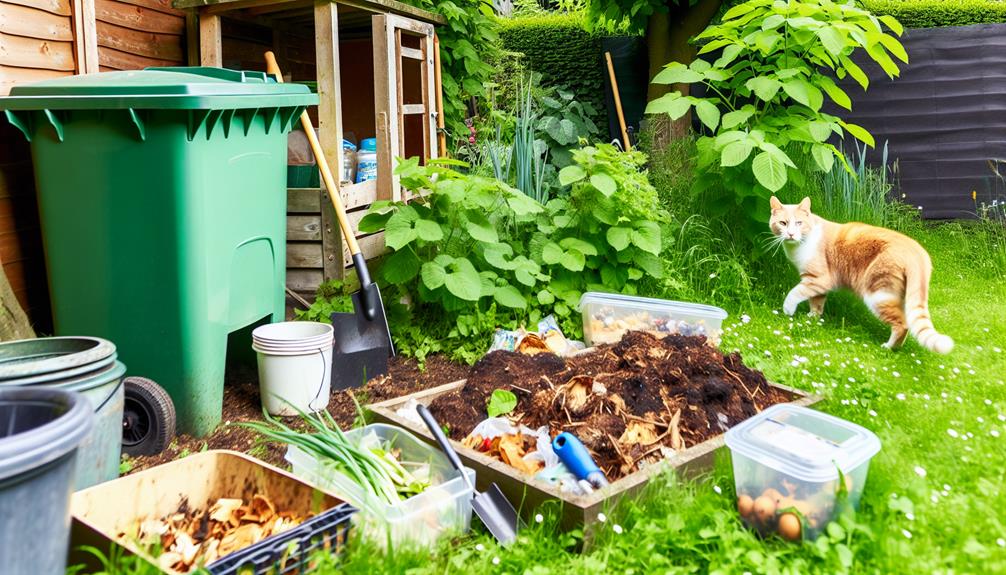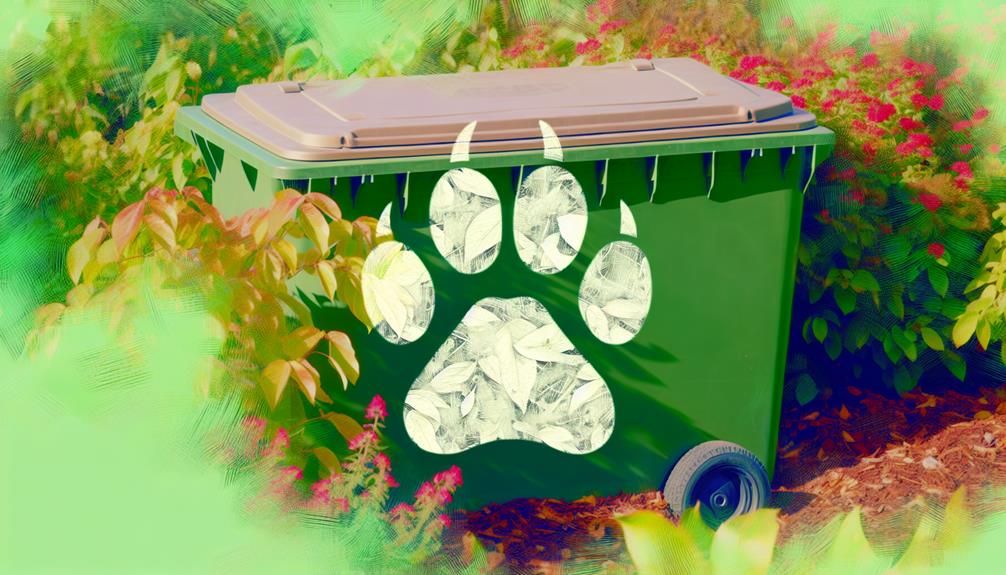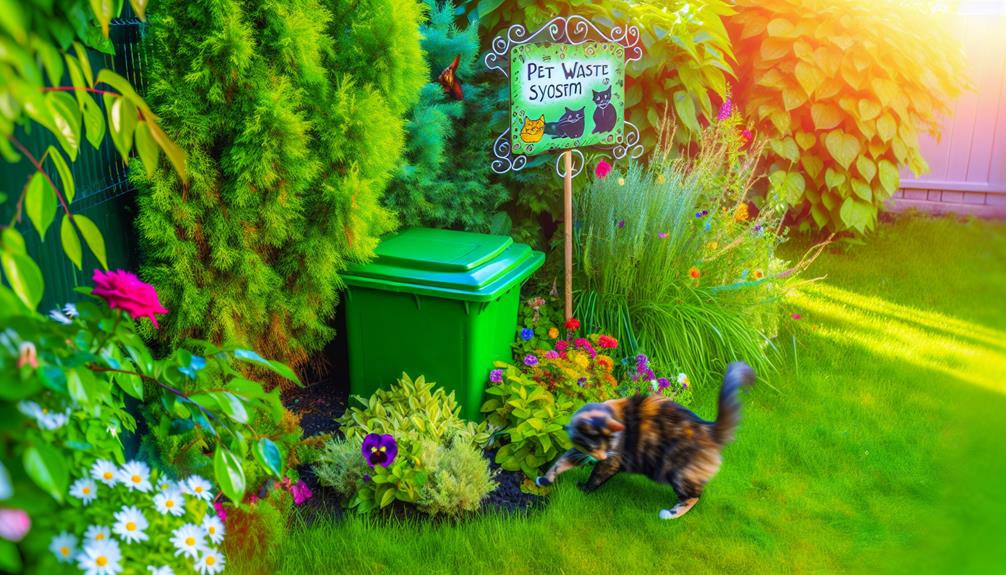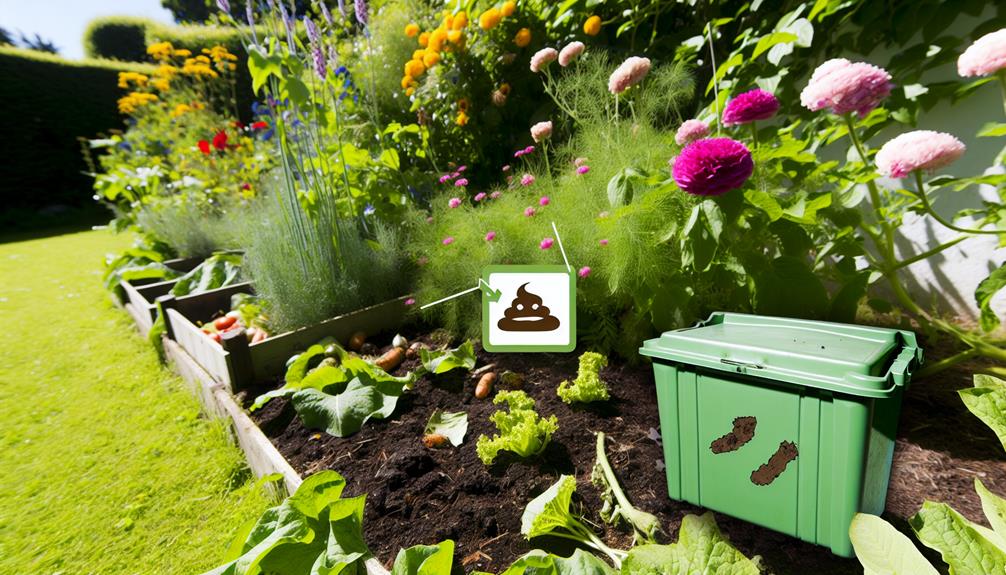

You can compost cat feces, but it’s risky due to harmful pathogens like Toxoplasma gondii, which can cause serious health issues, especially for pregnant women. These pathogens can survive in soil for up to 18 months. If you decide to compost, use a dedicated bin, and maintain high temperatures to kill harmful pathogens.
Curing for 6 months to a year ensures safety. Always wear gloves and wash hands thoroughly. For safer alternatives, consider biodegradable litter or specialized pet waste disposal services. Composting cat poop can enhance soil quality but poses risks, so understanding proper practices is essential. Learn more to stay safe!
When dealing with cat feces, it’s vital to understand toxoplasmosis, a parasitic disease caused by Toxoplasma gondii. This parasite can be a significant concern, especially for pregnant women.
When you handle cat feces, you risk exposure to toxoplasmosis, which can be harmful to unborn children. Toxoplasma gondii eggs can survive in soil for up to 18 months, making it imperative to manage cat waste properly.
Ingesting contaminated food or water can lead to flu-like symptoms or severe health issues. By understanding the risks and taking appropriate precautions, you can protect yourself and others in your community.
Proper disposal of cat feces is key to preventing the spread of this parasite and ensuring a safe environment.
Also Read: Can You Compost Asparagus?
Composting cat feces carries significant risks due to the potential spread of harmful pathogens and parasites like Toxoplasma gondii. This Toxoplasma gondii parasite can survive in soil for up to 18 months, posing serious health risks.
If you’re not careful, improperly composted cat feces can transmit toxoplasmosis, affecting both humans and animals. The parasite’s eggs can infect mammals like pigs, cows, and even people, leading to dangerous parasitic infections.
Cat feces can also harbor other harmful pathogens, increasing the risk of spreading diseases. Composting cat feces without proper precautions is risky and can lead to severe health problems. It’s essential to understand these dangers to keep your community safe and healthy.
Cat litter often ends up in landfills, where it can take years to decompose. Composting transforms it into useful fertilizer, improving soil quality and reducing waste.

Reducing landfill waste and protecting waterways are major environmental benefits of properly composting cat feces. By composting, you’re contributing to a cleaner, healthier planet.
Here’s a quick comparison to highlight the impact:
| Method | Waste Decomposition | Environmental Benefit |
|---|---|---|
| Landfill disposal | Slow | High waste, possible leachate |
| Flushing down the toilet | Potential contamination | Waterway pollution risk |
| Proper composting | Efficient | Reduced waste, enriched soil |
Also Read: Can You Compost Artichoke?
When composting cat feces, it’s important to use proper techniques to guarantee safety. You need to maintain high temperatures and allow for long curing times to kill harmful pathogens.
Guaranteeing the safe decomposition of cat feces involves using a dedicated compost bin to prevent contamination with other materials. When composting pet waste, make sure your compost pile reaches at least 145 degrees F for three days to kill pathogens. Use a separate compost bin specifically for cat waste to keep your compost safe and effective.
Here’s a quick guide to help you:
| Step | Action | Importance |
|---|---|---|
| Temperature | Reach 145°F for 3 days | Kills harmful pathogens |
| Compost Bin | Use a dedicated bin for cat waste | Prevents contamination |
| Curing Time | Cure for 6 months to a year | Ensures safety before use |
To maintain safety when composting cat feces, always wear gloves and thoroughly wash your hands afterward to guarantee the prevention of the spread of harmful pathogens. Dedicate a specific compost bin for cat feces to avoid cross-contamination with other compost materials.
Make sure your compost pile reaches a high temperature of at least 145 degrees F for an extended period to eliminate potential parasites. Regularly monitor the composting process to confirm proper decomposition and maintain health safety.
Several viable alternatives to composting cat feces can help you manage pet waste more safely and conveniently. Consider switching to biodegradable litter, which breaks down naturally and reduces the need for traditional composting.

You might also look into specialized pet waste disposal services; these services handle cat feces professionally, ensuring safe and eco-friendly disposal.
Another option is using septic systems designed for pet waste. These systems process waste efficiently, minimizing environmental impact and offering a hassle-free solution.
Also Read: Can You Compost Baking Soda?
Switching to biodegradable litter can significantly reduce your cat’s environmental footprint while making composting easier and more effective. By opting for plant-based litter made from corn, paper, pine, or sawdust, you guarantee that the materials break down naturally in compost piles. This not only helps decrease landfill waste but also creates a versatile fertilizer for your garden. Composting cat poop with biodegradable litter can enhance soil quality and protect waterways from contamination.
Here’s a quick comparison of popular biodegradable litters:
| Type | Material | Benefits |
|---|---|---|
| Corn | Plant-based | Breaks down quickly |
| Recycled Paper | Plant-based | Eco-friendly and soft |
| Pine | Plant-based | Natural odor control |
| Sawdust | Plant-based | Cost-effective |
Embrace biodegradable litter for a greener, cleaner composting experience!
Also Read: Can You Compost Barbecue Sauce?
When disposing of cat feces, it’s crucial to follow safe methods to avoid health risks and environmental contamination.
Composting cat poop isn’t recommended due to the risk of toxoplasmosis, a harmful parasite. Instead, scoop the soiled litter from the litter box and place it in sealed bags.
This prevents pathogens from escaping and contaminating your surroundings. Sending these sealed bags to landfills is the best way to guarantee safety.
Also Read: Can You Compost Basil?
When composting cat feces, you’ve got to be aware of the health concerns linked to pathogen risk factors and parasite transmission potential.
Cat feces can harbor the Toxoplasma gondii parasite, which can survive in soil for up to 18 months and pose serious health risks.
Improper composting can lead to infections, impacting both humans and animals, so it’s essential to handle and dispose of cat feces correctly to prevent disease spread.
Cat feces can harbor numerous harmful pathogens, posing significant health risks if not composted properly. One major pathogen risk factor is Toxoplasma gondii, a parasite that can cause toxoplasmosis in humans.
When you’re composting cat feces, it’s important to understand that improper methods can spread diseases. Toxoplasma gondii is particularly risky for pregnant women, as it can affect the fetus.
Pathogen eggs in cat feces can survive in soil for up to 18 months, making proper composting essential to prevent infection. By being mindful of these risks, you can take the necessary precautions to compost safely and protect your community.
Let’s collaborate to make sure our composting practices keep everyone healthy and safe!
Understanding the parasite transmission potential of composting cat feces highlights the importance of proper disposal methods to prevent health concerns. Cat feces can carry Toxoplasma gondii, a parasite that can cause severe health issues. These eggs can stay viable in soil for up to 18 months, posing a risk to humans and animals. Composting dog poop carries similar risks, transmitting parasites that can infect pets and people. Properly disposing of cat litter and dog waste is crucial to avoiding these dangers.
| Concern | Details |
|---|---|
| Parasite Transmission | Toxoplasma gondii in cat feces |
| Health Risks | Serious infections in humans and pets |
| Soil Contamination | Eggs viable for up to 18 months |
| Composting Risks | Dog and cat feces can spread parasites |
| Proper Disposal | Essential for preventing health concerns |
Composting cat feces can introduce harmful pathogens and parasites into your garden soil, posing significant risks to plant health and human safety.

When you compost your cat’s waste in compost bins, you might unknowingly spread Toxoplasma gondii, a dangerous parasite, especially harmful to pregnant women and their babies. Composting cat waste should be handled with extreme caution to avoid contamination.
Unfortunately, this compost isn’t suitable for edible plants, as it could lead to severe health hazards. By knowing these risks, you can better protect your garden and family. Instead, consider alternative disposal methods, ensuring your garden remains a safe and thriving environment.
Taking these precautions helps keep your garden community healthy and vibrant.
Experts strongly advise against composting cat feces due to the significant health risks it poses. Cat feces often contain Toxoplasma gondii, a harmful parasite whose eggs can survive in soil for up to 18 months.
When you compost pet waste improperly, you risk spreading infections that can seriously impact both human and animal health. For pregnant women, handling cat feces can lead to dangerous Toxoplasmosis, which emphasizes the need for caution.
To safely compost, it’s essential to exclude cat feces and opt for safer waste disposal methods. By following expert recommendations, you protect yourself and your community, ensuring a healthier environment for everyone.
No, it isn’t safe to compost cat poop. Harmful parasites like Toxoplasma gondii can linger and cause infections. Pregnant women are especially at risk. Stick to safe waste disposal to protect everyone’s health and well-being.
Cat poop takes between 6 months to 2 years to decompose, depending on temperature, moisture, and composting methods. With high temperatures and regular turning, you’ll speed up the process. Always guarantee pathogens are broken down for safety.
You shouldn’t compost pet waste because it can spread harmful pathogens and parasites. Even with composting, temperatures might not get high enough to kill them. This poses health risks, especially to pregnant women and immune-compromised individuals.
The most environmentally friendly way to dispose of cat poop is composting. It reduces landfill waste, enriches soil, and supports sustainable practices. Join the eco-friendly community by composting your cat’s poop and making a positive impact.
To wrap up, while composting cat feces may seem like a sustainable option, the risks of spreading toxoplasmosis and other pathogens make it unsafe for your garden.
Instead, explore safer composting practices and proper disposal methods to safeguard your health and the environment.
Remember, keeping your compost free of cat waste guarantees a healthier, more vibrant garden.
Follow expert recommendations to establish a sustainable, eco-friendly compost system that benefits both you and your plants.
